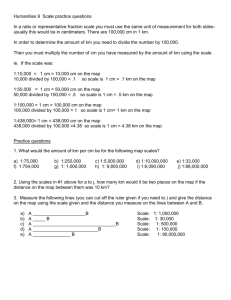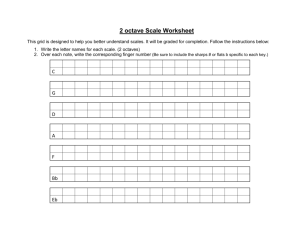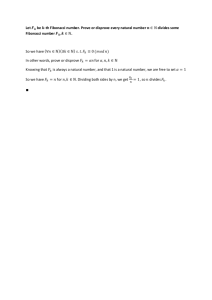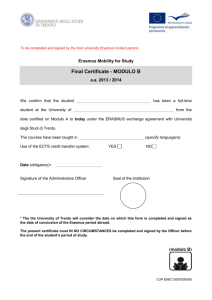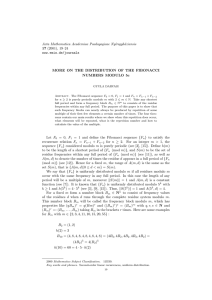oMaths_and_music
advertisement
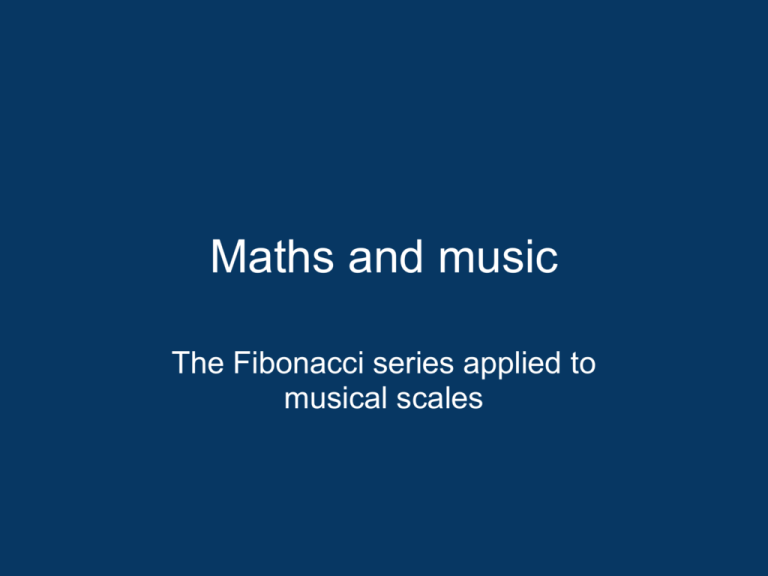
Maths and music The Fibonacci series applied to musical scales Today’s Aim: Map numbers from the Fibonacci series onto notes in various musical scales • Overview of Fibonacci series o Take 0 and 1, add them o Add the result (1) to the previous number (1) to get 2 o Add that result (2) to the previous number (1) to get 3 o ...and so on • One problem is that Fibonacci numbers grow very rapidly o Only 12 itterations before result >100 o Pisano sequence uses the Fibonacci rules, but with the numbers "capped" using modulo arithmetic Overview - Modulo arithmetic • Modulo operator reports the remainder after division o x = mod(a,n) o x will hold remainder after "a" is divided into "n" • Practical analogy is converting 24h time with a 12h clock o As you go round the clock: nums >12 wrap round to 1... o ...and 12 maps on to 0 • How does this apply to Fibonacci? o Fibonacci series is: 0,1,1,2,3,5,8,13,21,34,55,etc • In modulo 12 - everything is fine up to "13,21,34,55" o 13 maps to 1, o 21 maps to 9, o 34 maps to 10, o 55 maps to 7, etc... Overview - Musical scales • How do we apply Pisano to musical scales? o The black notes on the piano keyboard (C# D# F# G# A#) form a five note (pentatonic) scale o Number these 0,1,2,3,4 0 1 2 3 4 • Compute the Pisano sequence in modulo 5 o 0,1,1,2,3,0,3,3,1,4,0,4,4,3,etc... o Play the note numbers as they were assigned o C#(0), D#(1), D#(1), F#(2), G#(3), C#(0), G#(3),etc... Overview – Periodicity and scales • An interesting consequence of modulo arithmetic is that the resulting Pisano sequences become periodic depending on the modulo value • The modulo value is determined by the number of notes in the scale, so different scales will produce musical phrases with different periods o Two scales with the same number of notes in will certainly produce the same number sequence, but the notes themselves may be different (e.g. major/minor scales) • The term “scale” here is used very loosely – and can have anywhere between 1 and 12 notes. o Even the 12 note limitation can be relaxed if we venture into other tuning systems (such as the quarter-tone system or 72TET) Software demonstration Overview - Worksheet • Worksheet divided into 2 sections o Guided exercises o Guidelines/starting points for investigation • Worksheet also lists many example scales • If you have any questions, feel free to ask a lecturer • The Overview - Worksheet Read the worksheet fully and avoid skimming! The guided examples are designed to lead you through each step, and are therefore quite wordy o Missing out steps will easily lead to confusion! o
